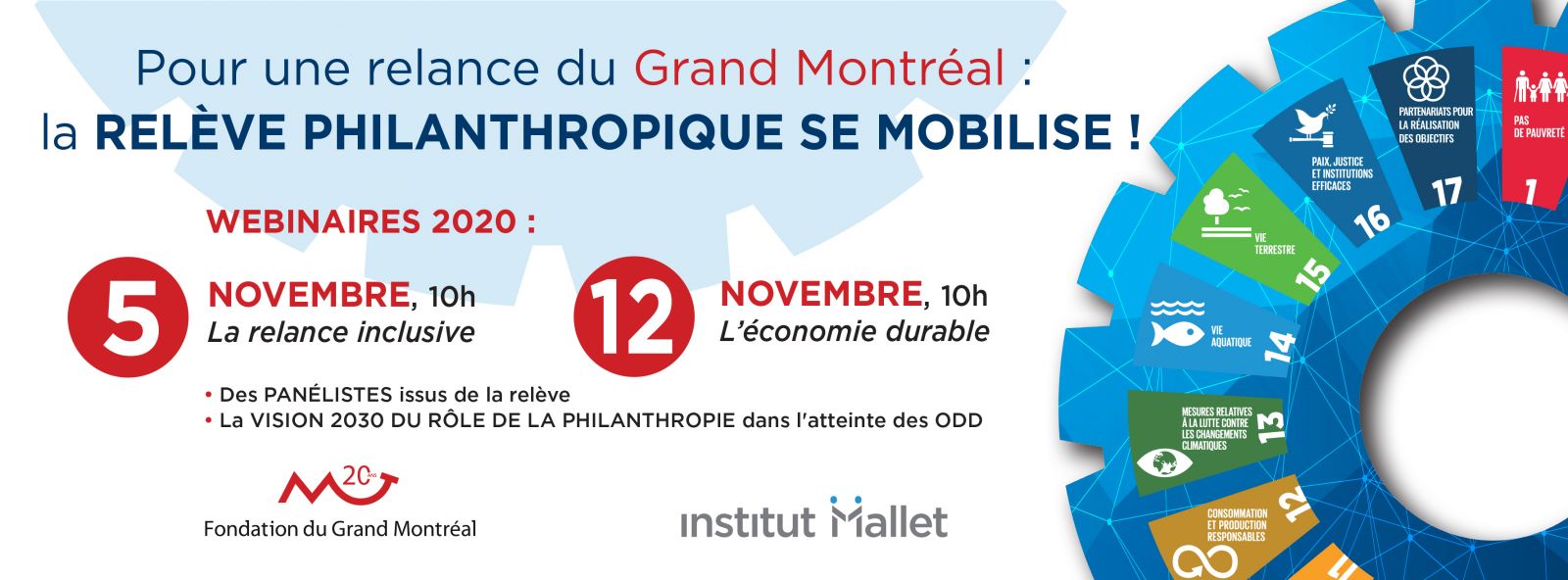Mécénat Musica reaches $100 million fundraising goal of in perpetuity…
Mécénat Musica has reached its $100 million goal of in perpetuity capital for Québec cultural organizations,…

For National Philanthropy Month 2020, the Foundation of Greater Montréal and Institut Mallet teamed up to help further the discussion about the future of philanthropy and the SDGs in Quebec, in the upcoming decade leading up to 2030. This partnership was made concrete by the organization of two webinars on November 5 and 12.
These two virtual panels allowed tomorrow’s leaders to expose their respective visions and projects for the decade leading up to 2030. They also discussed the role of philanthropy as an actor of change and resilience-building in the upcoming recovery and pursuit of the UN’s Sustainable Development Goals. The panels took on the following themes, click on the links below to (re)watch the recordings (in French)
Thursday, November 5, 2020 : For an inclusive recovery
Thursday, November 12, 2020 : For a sustainable economy
In June, the Foundation of Greater Montréal published its Vital Signs 2000 – 2019 report, a health check of our community in the perspective of the UN’s Sustainable Development Goals. This document highlighted a number of challenges we have to face as a community. The report also gave the opportunity to 13 young leaders to reveal their vision of the next decade.
Since then, the COVID-19 pandemic has upset the whole philanthropic and community sectors, as it did the rest of society. The pandemic put the spotlight on, and even accelerated, the issues we have to deal with. It also constitutes, for everyone in the philanthropic and community sector, a unique opportunity. We must raise fundamental questions about the way we do things. These are the discussions the Foundation of Greater Montréal and Institut Mallet invite you to attend.
Program and panelists
The 2020 Vital Signs report demonstrated that, in Montréal, no to little social progress has been made in the last 20 years. For example, Montréal remains the Canadian capital of poverty among children. How can we explain that, in 2019, about two thirds of the people living through food insecurity were employed? Why have we not progressed in the fight against domestic violence?
The COVID-19 pandemic also put the spotlight on other flaws in the social contract, such as systemic discrimination. We are in the midst of a perfect storm, which is forcing us to plan a new recovery. We must think about what we can and what we must do differently, as 2030 looms on the horizon.
The panelists
This pandemic broke the momentum enjoyed by the movement to fight climate change until the spring. The 2020 Vital Signs report also showed us that, despite our best efforts, the results are mixed at best. The Québec government indeed confirmed, in December 2019, that we would not reach our 2020 targets.
Coincidentally, the strong economic growth Montreal enjoyed since 2000 was also stifled by COVID-19. The unemployment rate skyrocketed. To this day, the pandemic left in its wake thousands of people in a precarious situation. In both cases, we will not know until much later the extent of the damages on society as a whole. As we prepare the recovery, how can we do things differently? How can we act now to rebound and relaunch our economy? How can we amplify efforts to protect our environment and our climate as we look forward to 2030?
The panelists
Mécénat Musica has reached its $100 million goal of in perpetuity capital for Québec cultural organizations,…
Trust-based philanthropy is as enriching as it is demanding. It redefines our funding procesess and…
To accomplish your philanthropic vision, donor-advised funds are a vehicle that stands out for its efficiency,…